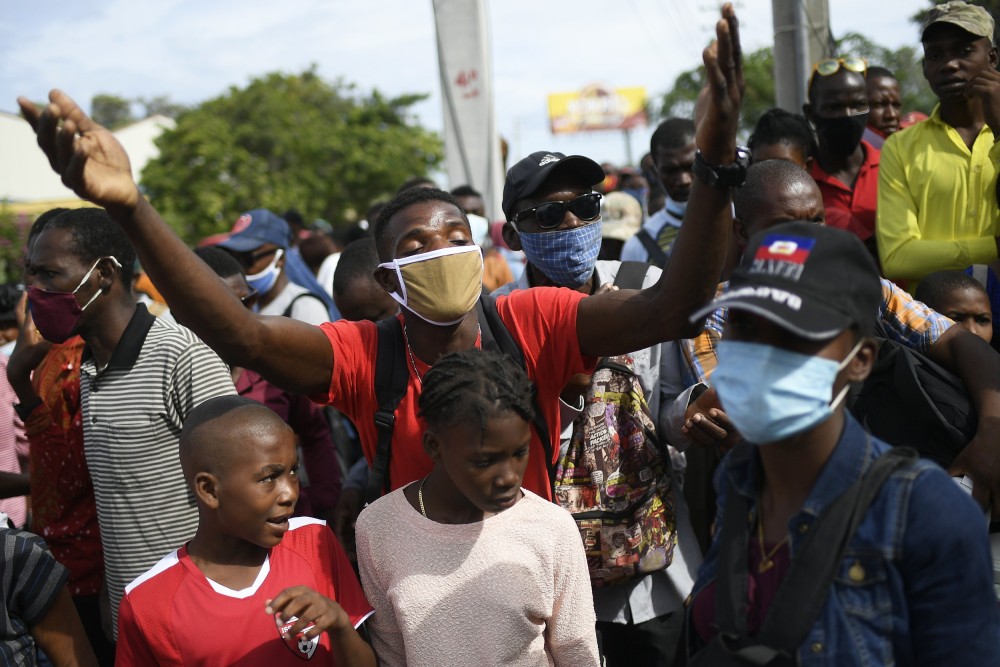 Matias Delacroix / AP
Matias Delacroix / AP People waiting for days to apply for U.S. visas react after learning that the U.S. Embassy will continue to be closed in Port-au-Prince, Haiti, on Monday.
The country of Haiti has been demonized for years in the international media. The Caribbean nation has been called everything, from a failed state to a nation of gangs.
The assassination of President Juvenal Moise in the dead of night on July 7, while engendering sorrow around the world, gave plenty of ammunition to media in America that have disdain for the country.
But first, let’s provide some perspective. Who did it? Who ordered it? Why? Who will now lead the country next? These are some the questions flooding the internet since the assassination of Moise.
The earlier coverages of Moise’s death seemed to be focused on the perpetrators of the crime as media organizations knew very little about the motive. Haitian police have since confirmed that they killed at least three suspects and arrested more than 20.
Haiti Gets a Bad Rap from Media in the US
News outlets over the world have reported on Moise’s assassination. But it appears that including degrading adjectives while describing Haiti is a common thread across these news outlets. While it is true that the Caribbean country has many faults, one can’t help but notice that certain mentions of its defects were somewhat unnecessary.
In a story for NBC News, Ave Leone, a 19-year-old Haitian American college student expressed her disappointment in the media coverage Haiti is getting.
“It’s weird to see Haiti placed in the spotlight so poorly,” she said. “It’s always referred to especially in times like these as the poorest country in the world when larger Western nations are the reason we’re poor to begin with.” When addressing the future of Haiti’s leadership, for example, a story in The New York Times stated, “Three men have come forward to stake a claim to leadership of the country, which was already rife with gang violence and hobbled by poverty.”
Another story from the New York Times takes it even further by providing a degrading analysis of “why Haiti still despairs after $13 billion in foreign aid.” This analysis goes into detail about Haiti’s history and the help it received internationally. The author states that “Haiti is less a failed state than what an analyst called an “aid state” — eking out an existence by relying on billions of dollars from the international community.”
While this description could be accurate when looking at the aid the country received, an important viewpoint seems to be missing from the story. The viewpoint of Haitians themselves who believe that foreign communities should stay out of Haiti and allow Haitians to grow and prosper on their own is nowhere to be found.
A popular opinion in the country is that foreign presence has only made things worse.
American Involvement in Haiti Comes Under Scrutiny
Investigations are starting to provide some answers as to the reasons why and how the assassination of the president took place. However, one question that remains unanswered is the one about the country’s future and its leadership.
The United States’ involvement with Haiti has also been getting a lot of attention.
When asked during a press briefing on July 12 about the results from an American delegation sent to Haiti, press secretary Jen Psaki said the U.S would remain deeply engaged as they have been for months before the assassination with individuals in Haiti to help move forward. “What was clear from their trip is that there is a lack of clarity about the future of political leadership,” she said.
Many refer to the American military and United Nations’ presence as a leading path to stability in Haiti. However, many Haitians seem to think the opposite.
“It’s like coming back with a toolbox, but the box has the wrong tools in it,” Monique Clesca, a Haitian pro-democracy activist and former United Nations official, told The New York Times. “What needs to be in the toolbox are voices from Haiti.”
Media in America especially make it seem like Haitians are in dire need of help from the U.S. However, Clesca and many other Haitians seem to think that America’s past intervention left the country a lot worse.
